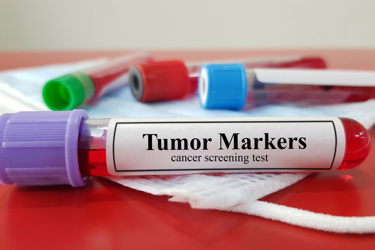AstraZeneca Goes All-In On Biomarker Testing & Education

By Ed Miseta, Chief Editor, Clinical Leader

Omar Perez is always looking for a new challenge. As a cancer survivor, he was driven to seek better therapeutic options in oncology for those who have been less fortunate. That led to Stanford, where he earned his doctorate in Molecular Pharmacology just as the mapping of the human genome was being completed.
Ever since, he’s become increasingly dedicated to overcoming challenges in oncology and precision medicine as an inventor, entrepreneur and in roles of increasing responsibility at Pfizer and GSK. In March of 2021, he joined AstraZeneca as Head of Medical Diagnostics, US Medical Affairs Oncology.
“I was excited by the company’s ambition to advance precision medicine by dramatically accelerating biomarker testing across all cancer and tumor types by 2025,” says Perez. “With insights uncovered through biomarker testing, we have the ability to specifically target drivers of tumor growth. However, we need tools to be able to properly identify patients.”
Recent breakthroughs in precision medicine are revolutionizing cancer care and biomarkers are a key part of the puzzle. Scientific data has been generated that will help researchers understand the biology of cancer and more specifically, tumor profiles at the molecular level. This will assist with understanding what is driving tumorigenesis. Yet, despite immense scientific advancements in recent years, biomarker testing is not always the standard of care for most people living with cancer.
“AstraZeneca is committed to eliminating barriers to biomarker testing by educating patients and HCPs and collaborating with key stakeholders in the oncology community to integrate comprehensive biomarker testing into clinical practice,’ says Perez. “Biomarker testing identifies precise targets so that patients may receive a personalized treatment plan. In earlier stages of disease, this treatment plan can offer the possibility of cure.”
Find The Right Patient
The challenge for oncology researchers is getting the right drugs to the right patients. That entails having the ability to identify them upfront based on their tumors or genetic profile.

While that model has taken precedence within the oncology space, the science has evolved and is now starting to have a positive impact in areas outside of oncology. The ability to refine the patient population based on some genetic or underlying disease parameter is what lends itself to biomarker selection.
“That strategy has now been incorporated into many clinical drug development programs,” says Perez. “Approximately 90% of the AstraZeneca portfolio now has an embedded precision medicine strategy. I think that really highlights the growing emergence of biomarkers. To get the right drugs to the right patient, we can no longer take broad-based approaches where we don’t have molecular insights beforehand.”
Perez notes other emerging technologies will further enhance the ability of researchers to design better and more targeted approaches and treatments. In the future, as these technologies expand beyond oncology, they will provide patients with more therapeutic options.
Changes Are Coming
There will be changes coming to oncology trials resulting from biomarker development. Perez notes the hypothesis that goes into a clinical trial design originates early in the drug discovery process. If you can identify a marker or a set of markers, that provides an opportunity to design trials that are more specifically focused on a patient population. Another advancement is liquid biopsies, which allow researchers to determine an individual's tumor profile by virtue of a blood sample. “These advancements are allowing researchers to ask bolder questions and more quickly identify patients,” states Perez.
“Within the oncology space, the concept of biomarker testing has taken precedence,” Perez continues. “As a result, AstraZeneca and other pharma companies are taking a very active approach. We are looking forward to the day when we expand beyond just tissue testing or blood-based testing post a cancer diagnosis. Digital innovation and emergence of early cancer screening technologies will soon allow us to look earlier at a patient’s genetic profile or tumor profile, which will provide more powerful insights to identify cancer and provide appropriate treatment options.”
Perez believes we are now at a tipping point in drug development. Oncology has demonstrated the value of these technologies and their ability to shorten the drug development timeline.
In the future, more machine learning tools will be deployed, and they will assist with speeding drug development and eliminating failures. Perez notes the computational tools being designed for machine learning and artificial intelligence will innovate clinical trial design, feasibility, and execution while streamlining those processes.
Accelerate The Use Of Biomarkers
“To realize our ambition and significantly accelerate biomarker testing it will require smarter and better ways of collecting and processing data,” says Perez. “There are efforts underway in a variety of development programs to use computational means to get data quicker and make more informed decisions. I believe the result will be an improved and streamlined process for trial startup and execution. That is definitely a ripe area for innovation.”
AstraZeneca also plans to accelerate its use of biomarkers in clinical trials over the next five years.
“We hope to do that a couple of different ways,” says Perez. “One thing we are going to generate evidence to support this need, to illustrate that biomarker testing alone isn't adequate to really get patients optimal treatment options. We have a couple of partnerships with a variety of groups that can help increase awareness and education around this.”
AstraZeneca is also focusing on education and aims to increase the level of biomarker awareness. Awareness needs to be increased in the medical communities amongst practicing physicians and oncologists, but also across the community of individuals affected by it. That includes patients, caregivers, and policy makers.
One initiative, AstraZeneca’s ‘YOUR Cancer’ program, was designed to highlight the different individuals and organizations who are at the forefront of cancer care. The YOUR Cancer program brings together patients, caregivers, advocacy groups, researchers, healthcare providers, and policy makers to transform cancer care from one person’s disease into a true community effort.
Another AstraZeneca initiative, the Lung Ambition Alliance (LAA), is a coalition founded together with the International Association for the Study of Lung Cancer, Guardant Health, and the Global Lung Cancer Coalition. The LAA’s ambition is to eliminate lung cancer as a cause of death and double five-year survival by 2025 by advocating for improved approaches in three key areas: increasing lung cancer screening and early diagnosis rates, accelerating the delivery of innovative therapies, and improving the quality of care to provide better outcomes for patients.
Perez is confident his background as a diagnostics leader will help the company elevate awareness and education around biomarker testing. “AstraZeneca is recognizing the value of the diagnostics that are enabling identification of trial patients most likely to benefit from these therapies,” says Perez. “That is what really attracted me to be part of the team.”
“I have been involved in various facets of the drug development journey for the last 15 years,” adds Perez. “This is definitely a continuous journey. By the year 2025, I believe we can significantly impact evidence generation, education, and policy. I look forward to the success we will see from these programs in the coming years.”
